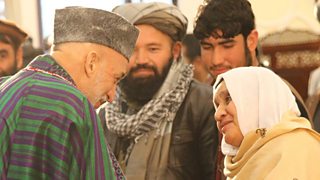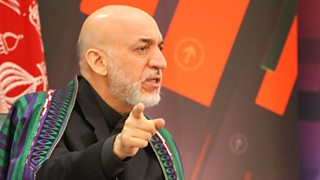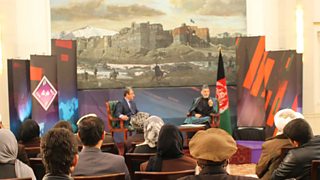Open Jirga: Afghans question President Karzai
Shirazuddin Siddiqi
Country Director, Afghanistan
Tagged with:

Early in 2013, Daud Junbish, the presenter of the Open Jirga debate show, was invited for lunch at the Presidential Palace with President Hamid Karzai and a large group of guests. The president suggested a separate meeting, at which he described himself as a 'fan' of Open Jirga. Daud invited him to appear on the show, and he accepted.
This was a massive undertaking in a country where security incidents, including suicide bombings, have become so common. We agreed to avoid President Karzai's name in any correspondence and call this edition of the programme 'Open Jirga on Governance'.
The special episode – featuring the president as the sole guest to debate with the studio audience – was broadcast last night on the Βι¶ΉΤΌΕΔ language services for Afghanistan in Pashto and Dari and on the state broadcaster, Radio Television Afghanistan (RTA)’s, radio and TV channels. (For a slideshow from the night, click )
It was an extraordinary experience to bring 70 men and women from all corners of the country to Kabul without telling them who was going to take their questions. Only once inside the Palace entrance was the identity of the guest revealed.
It was not difficult to see the sense of nervousness, disbelief and excitement all mixed up. The team needed to do longer warm up sessions than usual to get the questions flowing.

Audience questions covered a wide range of topics including President Karzai’s performance over the last decade, Afghanistan’s relationship with the international community and the US, the rule of law, infrastructure and peace with the Taliban.
In response to a question on corruption, the president said: "There is no doubt that administrative corruption exists in Afghanistan. But if you wish that the President should announce that corruption should be stopped, and it would be stopped, this is not how it works. Corruption is a social problem, it is hidden. It can be stopped by strengthening institutions and by reforming regulations."
While Afghan people have met with President Karzai and other senior policy makers over the years, they tend to have this access because they are well-connected and from urban centres.
Our Open Jirga audiences set a new precedent because they represent the broadest possible cross section of Afghan society. For Monday's special episode, we brought together an audience from some of the poorest and most remote parts of the country.
It was a unique opportunity for people who are otherwise voiceless in the national context to sit face-to-face with their president. The audience included teachers and lawyers as well as local cobblers, community elders, housewives, farmers, shopkeepers, tailors, drivers, bakers, and butchers.
Μύ

A member of the audience said to the president: "When we voted for MPs we thought they would convey our concerns and issues somewhere but none of them did. They only conveyed the complaints of their relatives, and made them rich, but paid no attention to poor and needy citizens."
Not everyone got the answers they wanted, or even a chance to ask a question. But the atmosphere overall at the end of the show was one of real satisfaction.
When the recording finished, the president took advantage of the secure setting of his compound to mingle with the audience and answer some further questions. In countries like Afghanistan, this normally can't happen – politicians are protected behind numerous layers of thick concrete walls.
Afterwards, the audience chatted with excitement. An audience member from the Faryab provinces who was very concerned about the security situation in his region said: "I feel so light and relieved. I have taken my worry out of my chest and put it directly to the president."
For me, that summed up the purpose of Open Jirga.
Related links
(4 MB PDF)
